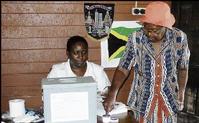Edmond Campbell, Senior News Coordinator 
An Electoral Office of Jamaica employee oversees voting in the Eastern Westmoreland constituency by-election held last month. Joyce Buchanan (standing), mother of the successful People's National Party contender Luther Buchanan, dips her finger in ink after casting her vote. - Adrian Frater Photo
THERE IS growing convergence between the two major political parties and members of the Electoral Advisory Committee (EAC) on the issue of campaign financing.
For years, the two major political parties and various commentators have expressed diverse views on the once controversial subject.
Director of Elections, Danville Walker, says the political representatives and independent members of the EAC are expected to sign off on a number of recommendations dealing with how political parties are financed.
He told The Gleaner that once an agreement is reached the EAC will submit a report, which will be examined by Cabinet. Following Cabinet's approval, the document will then be drafted into a bill and taken to the House for debate.
Despite near accord between the political groups on the subject, General Secretary of the Jamaica Labour Party (JLP) Karl Samuda said the JLP does not accept the proposal that the names of persons who contribute to political parties should be made public.
However, he assured that his party was in full support of legislation governing campaign financing.
The issue of tainted money used in political campaigns is not uncommon in Jamaica and questions have been raised in the past about the source of funding for political parties.
Government Senator Professor Trevor Munroe, in particular, has for years maintained a strong stance on the need for an examination of party funding.
Independent Member of Parliament for St. Catherine North Eastern, Abe Dabdoub, tabled a bill in Parliament recently, addressing the twin issues of campaign financing and registration of political parties.
According to Mr. Dabdoub, the lack of transparency by political parties to their membership has contributed significantly to the belief that many politicians are either involved with, or are being funded by, persons whose source of funds is questionable.
"When that has been achieved, one can look at taking money from the public purse to fund elections because then the public will be aware of how its money is being utilised and accounted for," Mr. Dabdoub previously told The Gleaner.
EAC recommendations
on campaign financing
To ammend sections 53-61 of the Representation of the People Act to remove loopholes to facilitate enforcement of the law.
To increase the limits of candidates' expenditure in keeping with inflation.
To increase fines for illegal practices.
To improve the provision for disclosure and transparency.
To report expenditure by affiliated organisations.
The registration of political parties to ensure greater scrutiny and accountability to members of the public in the disclosure of their assets and liabilities.
Political parties to issue audited financial reports to the electoral commission that would be published by the commission.
Annual election of officers of the political parties.
Registered political parties would be eligible to receive public funding to a prescribed maximum.
To limit the maximum expenditure for elections by political parties.
Parties should submit annual budgets and give statements of their financial activities six months after an election.
Sanctions for breaches for inadequate and false reporting could lead to suspension of entitlement and deregistration.
Sanctions would be enforced for donations from anonymous sources.

